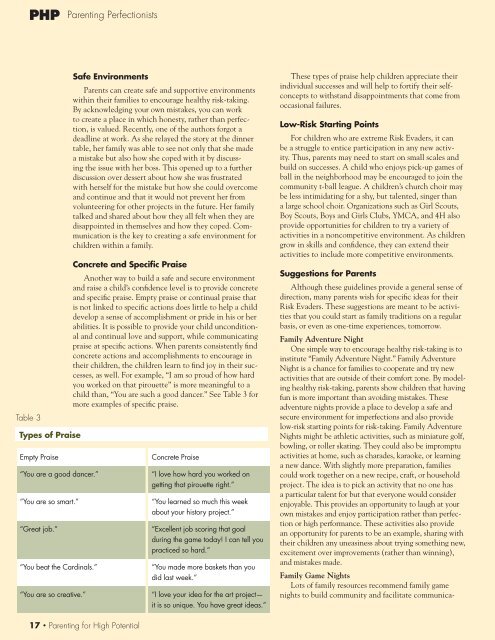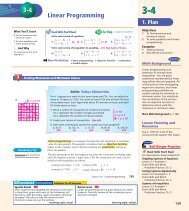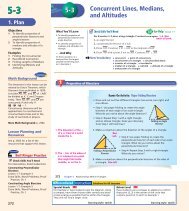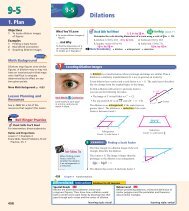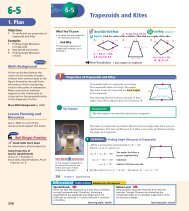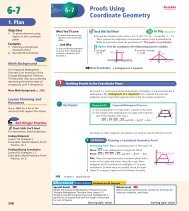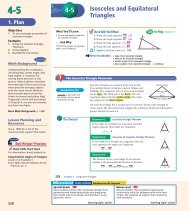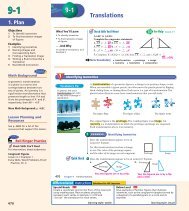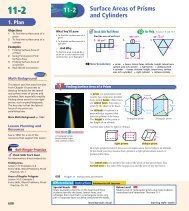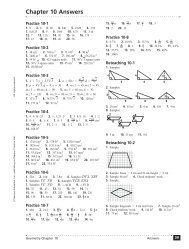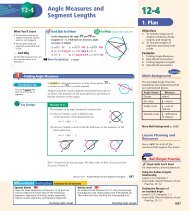Parenting - Finneytown Local School District
Parenting - Finneytown Local School District
Parenting - Finneytown Local School District
Create successful ePaper yourself
Turn your PDF publications into a flip-book with our unique Google optimized e-Paper software.
Table 3<br />
PHP <strong>Parenting</strong> Perfectionists<br />
Types of Praise<br />
Empty Praise<br />
“You are a good dancer.”<br />
“You are so smart.”<br />
“Great job.”<br />
“You beat the Cardinals.”<br />
“You are so creative.”<br />
Safe Environments<br />
Parents can create safe and supportive environments<br />
within their families to encourage healthy risk-taking.<br />
By acknowledging your own mistakes, you can work<br />
to create a place in which honesty, rather than perfection,<br />
is valued. Recently, one of the authors forgot a<br />
deadline at work. As she relayed the story at the dinner<br />
table, her family was able to see not only that she made<br />
a mistake but also how she coped with it by discussing<br />
the issue with her boss. This opened up to a further<br />
discussion over dessert about how she was frustrated<br />
with herself for the mistake but how she could overcome<br />
and continue and that it would not prevent her from<br />
volunteering for other projects in the future. Her family<br />
talked and shared about how they all felt when they are<br />
disappointed in themselves and how they coped. Communication<br />
is the key to creating a safe environment for<br />
children within a family.<br />
Concrete and Specific Praise<br />
Another way to build a safe and secure environment<br />
and raise a child’s confidence level is to provide concrete<br />
and specific praise. Empty praise or continual praise that<br />
is not linked to specific actions does little to help a child<br />
develop a sense of accomplishment or pride in his or her<br />
abilities. It is possible to provide your child unconditional<br />
and continual love and support, while communicating<br />
praise at specific actions. When parents consistently find<br />
concrete actions and accomplishments to encourage in<br />
their children, the children learn to find joy in their successes,<br />
as well. For example, “I am so proud of how hard<br />
you worked on that pirouette” is more meaningful to a<br />
child than, “You are such a good dancer.” See Table 3 for<br />
more examples of specific praise.<br />
3 • 17 <strong>Parenting</strong> • <strong>Parenting</strong> for High for Potential High Potential<br />
Concrete Praise<br />
“I love how hard you worked on<br />
getting that pirouette right.”<br />
“You learned so much this week<br />
about your history project.”<br />
“Excellent job scoring that goal<br />
during the game today! I can tell you<br />
practiced so hard.”<br />
“You made more baskets than you<br />
did last week.”<br />
“I love your idea for the art project—<br />
it is so unique. You have great ideas.”<br />
These types of praise help children appreciate their<br />
individual successes and will help to fortify their selfconcepts<br />
to withstand disappointments that come from<br />
occasional failures.<br />
Low-Risk Starting Points<br />
For children who are extreme Risk Evaders, it can<br />
be a struggle to entice participation in any new activity.<br />
Thus, parents may need to start on small scales and<br />
build on successes. A child who enjoys pick-up games of<br />
ball in the neighborhood may be encouraged to join the<br />
community t-ball league. A children’s church choir may<br />
be less intimidating for a shy, but talented, singer than<br />
a large school choir. Organizations such as Girl Scouts,<br />
Boy Scouts, Boys and Girls Clubs, YMCA, and 4H also<br />
provide opportunities for children to try a variety of<br />
activities in a noncompetitive environment. As children<br />
grow in skills and confidence, they can extend their<br />
activities to include more competitive environments.<br />
Suggestions for Parents<br />
Although these guidelines provide a general sense of<br />
direction, many parents wish for specific ideas for their<br />
Risk Evaders. These suggestions are meant to be activities<br />
that you could start as family traditions on a regular<br />
basis, or even as one-time experiences, tomorrow.<br />
Family Adventure Night<br />
One simple way to encourage healthy risk-taking is to<br />
institute “Family Adventure Night.” Family Adventure<br />
Night is a chance for families to cooperate and try new<br />
activities that are outside of their comfort zone. By modeling<br />
healthy risk-taking, parents show children that having<br />
fun is more important than avoiding mistakes. These<br />
adventure nights provide a place to develop a safe and<br />
secure environment for imperfections and also provide<br />
low-risk starting points for risk-taking. Family Adventure<br />
Nights might be athletic activities, such as miniature golf,<br />
bowling, or roller skating. They could also be impromptu<br />
activities at home, such as charades, karaoke, or learning<br />
a new dance. With slightly more preparation, families<br />
could work together on a new recipe, craft, or household<br />
project. The idea is to pick an activity that no one has<br />
a particular talent for but that everyone would consider<br />
enjoyable. This provides an opportunity to laugh at your<br />
own mistakes and enjoy participation rather than perfection<br />
or high performance. These activities also provide<br />
an opportunity for parents to be an example, sharing with<br />
their children any uneasiness about trying something new,<br />
excitement over improvements (rather than winning),<br />
and mistakes made.<br />
Family Game Nights<br />
Lots of family resources recommend family game<br />
nights to build community and facilitate communica-


